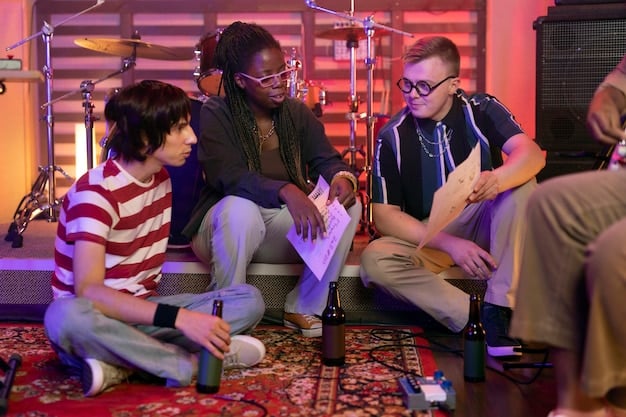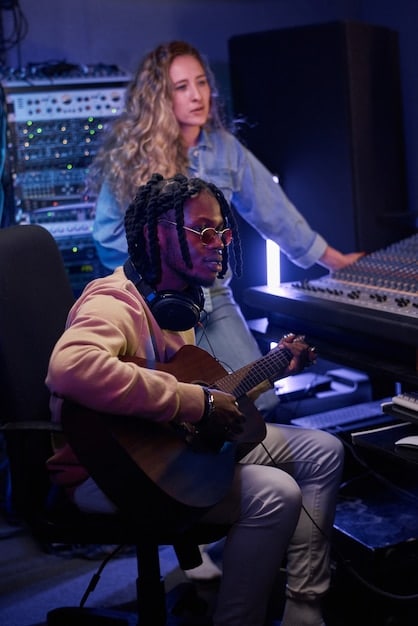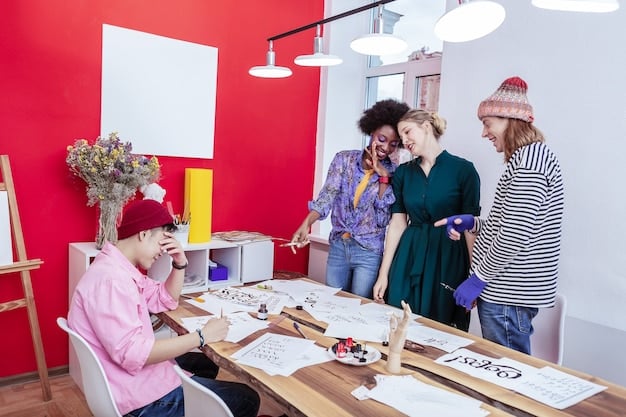The Importance of Networking: Building Connections in the Underground Music Scene

Effective networking is crucial in the underground music scene, fostering collaborations, opening doors to new opportunities, and ensuring sustainable growth for artists and professionals alike.
The exhilarating pulse of the underground music scene thrives on raw talent and passionate dedication. Yet, beyond the electrifying performances and groundbreaking sounds, a fundamental element often dictates success and longevity: The Importance of Networking: Building Connections in the Underground Music Scene. It’s not merely about who you know, but about fostering genuine relationships that can elevate careers, spark innovative collaborations, and sustain a vibrant community.
The Genesis of Connection: Why Networking Matters
In the often-unpredictable world of underground music, formal structures are rare. Success isn’t always charted by major labels or mainstream radio play, but by sustained engagement, word-of-mouth, and organic growth. This is precisely where networking becomes invaluable—it’s the invisible thread weaving together the fabric of the scene.
Networking provides an essential framework for artists, producers, promoters, and venue owners to discover each other, share resources, and collectively build something stronger than any individual effort. It transforms isolated artistic pursuits into a communal endeavor, fostering mutual support and shared opportunities that are otherwise inaccessible.
Beyond the Stages: Unseen Benefits of Networking
Many perceive networking as a transactional exchange, but in the underground, it’s far richer. It’s about building trust, sharing knowledge, and even finding mentorship. These relationships can shape an artist’s trajectory in profound ways, offering guidance that formal education often cannot provide.
- Access to Opportunities: Discovering gigs, collaborations, and new venues.
- Skill Exchange: Learning from peers, sharing production techniques or marketing insights.
- Emotional Support: Finding encouragement and understanding in a challenging industry.
- Resource Sharing: Borrowing equipment, finding affordable rehearsal spaces, or sourcing materials.
These benefits aren’t just theoretical; they are practical pillars that hold up the scene. A producer might connect with a vocalist online, leading to a groundbreaking track. A band might meet another at a local show, resulting in a joint tour. Every connection, no matter how small, has the potential to unlock new pathways and amplify creative output.
Ultimately, the importance of networking within the underground music landscape can’t be overstated. It’s the lifeblood that keeps the scene dynamic, innovative, and resilient. Without these interwoven connections, the scene would quickly fragment, losing its collective power and vibrant spirit.
Navigating the Scene: Where and How to Network Effectively
Networking in the underground music scene isn’t about handing out business cards in a stiff suit. It’s an organic process, deeply embedded in the culture itself. Understanding where to be, and how to genuinely interact, is key to forging meaningful connections.
The most authentic connections often happen in unexpected places, born from shared experiences and a mutual passion for music. It’s less about formal events and more about immerse yourself in the natural habitats of the scene.
Key Venues and Digital Hubs for Connection
The physical spaces are often the most fertile ground for face-to-face interactions. These can range from intimate house shows to bustling club nights, each offering unique opportunities to meet fellow music enthusiasts and professionals.
- Local Gigs and Shows: Attend performances, especially those of emerging artists.
- Record Stores & Indie Shops: Often community hubs, they can lead to introductions.
- Music Festivals & Conferences: Larger gatherings offer concentrated networking opportunities.
- Online Communities: Forums, Discord servers, and artist-centric social media groups.
Beyond physical presence, digital platforms have become indispensable. Websites dedicated to underground genres, artist forums, and even specialized social media groups can bridge geographical gaps, allowing musicians to connect globally. The key is to engage authentically, contributing to discussions rather than merely promoting oneself.

When approaching someone, genuine curiosity about their work or passions is far more effective than a direct pitch. Ask questions, listen actively, and share your own experiences and aspirations in a conversational manner. Remember, everyone started somewhere, and humility goes a long way. The goal isn’t just to accumulate contacts, but to build a supportive network that understands the unique challenges and triumphs of the underground.
Cultivating Authentic Relationships: Beyond the Transaction
The stereotype of networking often involves a superficial exchange of contact information, driven by a hidden agenda. In the underground music scene, this approach rarely yields lasting results. Authenticity is paramount. True networking is about building relationships based on mutual respect, shared interests, and genuine connection.
It’s about demonstrating interest in others’ projects, offering help when possible, and celebrating their successes. This approach fosters a community where reciprocity is valued, and opportunities arise naturally from genuine rapport rather than forced interaction.
Strategies for Lasting Connections
The foundation of any strong relationship is trust. In the music industry, where competition can be fierce, trust becomes even more vital. By consistently being reliable, honest, and supportive, you build a reputation that precedes you, opening doors that might otherwise remain closed.
- Be a Connector: Introduce people who could benefit from knowing each other.
- Offer Value First: Think about how you can help others before asking for help.
- Follow Up Thoughtfully: A brief message referencing a shared experience is more impactful than a generic one.
- Show Up & Support: Attend others’ shows, promote their work, and offer genuine encouragement.
Attending events, offering technical assistance, or simply sharing a new artist’s track can solidify connections. These seemingly small gestures accumulate over time, creating a robust network of individuals who are genuinely invested in each other’s growth. Building such a network requires patience and consistent effort, but the rewards—in terms of collaborative opportunities, creative inspiration, and enduring friendships—are immeasurable.
Furthermore, understanding the unspoken rules and nuances of the underground scene is crucial. It’s often a tight-knit community, and sincerity is valued above all else. Avoid gatekeeping, embrace diverse sounds, and be open to learning from everyone you meet, regardless of their perceived status. This inclusive mindset strengthens the entire ecosystem.
The Role of Collaboration in Networking
Collaboration is arguably the highest form of networking in the underground music scene. It’s where shared connections transform into shared creative output, pushing artistic boundaries and multiplying reach. Working with other artists, producers, and performers not only refines individual skills but also significantly expands one’s network.
Every collaborative project introduces you to the collaborators’ existing networks, effectively doubling or tripling your reach with each new endeavor. This organic expansion of contacts is far more powerful than any purely transactional networking effort.
Benefits of Creative Partnerships
Think of collaboration not just as pooling resources, but as merging creative visions. This synergy often leads to innovative sounds and ideas that wouldn’t have emerged otherwise. The process itself builds deeper bonds and a shared history that transcends mere professional acquaintance.
- New Perspectives: Exposure to different creative processes and ideas.
- Skill Diversification: Learning new techniques or software from collaborators.
- Audience Crossover: Tapping into new fan bases through joint releases or performances.
- Increased Output: Producing more music or content through shared effort.
Collaborating can take many forms: joint EPs, shared live performances, guest appearances on tracks, or even co-hosting events. Each collaboration is a demonstration of your ability to work with others, a critical soft skill in any creative industry. Moreover, successful collaborations serve as powerful testimonials, showcasing your professionalism and artistic integrity to your growing network.
The stories of legendary collaborative duos and groups in music are rooted in initial connections and a willingness to explore creative synergies. These partnerships often evolve into long-term professional relationships, providing consistent opportunities for growth and innovation. Embracing collaboration is not just about making more music; it’s about building a stronger, more interconnected artistic community.
Overcoming Challenges and Sustaining Connections
Networking, like any skill, presents its own set of challenges. Introversion, fear of rejection, and the sheer time commitment can deter even the most ambitious individuals. In the underground music scene, these challenges are amplified by its often informal and competitive nature.
However, understanding these hurdles is the first step toward overcoming them. Persistence, genuine interest, and a strategic approach can transform networking from a daunting task into an enjoyable and productive aspect of your musical journey.
Common Obstacles and Solutions
One of the biggest challenges is maintaining connections over time. Life happens, people move, and priorities shift. A truly strong network requires consistent, albeit not overwhelming, nurturing.
- Time Constraints: Dedicate specific, manageable blocks of time each week to outreach.
- Introversion: Focus on quality over quantity; engage in deep, meaningful conversations rather than light exchanges.
- Fear of Rejection: Understand that not every connection will flourish, and that’s okay. Focus on learning from each interaction.
- Maintaining Relevance: Share your progress, support others, and stay engaged in relevant conversations.
For those who are more introverted, starting with online interactions can be less intimidating. Commenting thoughtfully on posts, participating in online forums, or responding to direct messages can build a preliminary rapport before transitioning to in-person meetings. Remember, every major connection starts with a single interaction, however small.

Sustaining connections also means being a resource for others. If you come across an opportunity that might suit someone in your network, share it. If someone asks for advice, offer it genuinely. This reciprocal generosity is what truly reinforces a network, transforming a list of contacts into a supportive community.
The transient nature of trends within the underground scene also means that networks must be adaptable. Staying curious, open to new sounds, and willing to embrace evolving subgenres will ensure your connections remain relevant and vibrant over time. True sustainability in networking comes from genuine kindness and a shared passion for the music itself.
The Future of Connections: Digital vs. Physical Networking
The landscape of networking is continuously evolving, particularly with the acceleration of digital tools and platforms. While physical presence at gigs and events remains invaluable, the digital realm offers unprecedented opportunities for reach and specific targeting.
The most effective strategy likely lies in a hybrid approach, leveraging the strengths of both digital and physical interactions to build a comprehensive and resilient network. Understanding when to use each channel is key to maximizing your networking efforts.
Synergy of Online and Offline Engagement
Online platforms offer the ability to connect with individuals globally, transcending geographical limitations. Social media, specialized music platforms, and collaborative tools enable artists to find like-minded individuals and distant opportunities. This is particularly beneficial for niche genres within the underground scene, where the local talent pool might be limited.
- Digital Tools: Social media, online forums, collaborative software, and streaming platforms.
- Physical Impact: Live shows, industry meetups, local workshops, and spontaneous encounters.
- Hybrid Approach: Meeting online contacts in person, or following up on physical interactions digitally.
- Global Reach: Digital connections enable collaborations and audiences beyond local scenes.
The challenge with digital networking is to differentiate yourself in a crowded space. Genuine engagement—commenting thoughtfully, sharing relevant content, and initiating meaningful conversations—stands out far more than generic self-promotion. Using digital platforms to research and connect before attending a physical event can also make in-person interactions more productive.
Conversely, physical interactions build a level of rapport and trust that digital connections can struggle to replicate. The energy of a live show, the shared experience of an intimate venue, or a face-to-face conversation can forge bonds that are deeper and more memorable. These in-person meetings often serve as catalysts for subsequent digital collaborations or sustained online engagement.
Ultimately, the future of networking in the underground music scene is about seamless integration. An artist might discover a foreign producer through an online forum, work on a track digitally, and then meet at a festival, solidifying their creative partnership. This fluidity between digital and physical spaces ensures that connections are not only made but truly nurtured and sustained.
The Long-Term Impact of a Strong Network
The benefits of effective networking in the underground music scene extend far beyond individual opportunities. A strong, interconnected community fosters innovation, resilience, and sustainability for the entire ecosystem. It creates a virtuous cycle where collective growth reinforces individual success, and vice versa.
Over the long term, a well-cultivated network transforms from a collection of contacts into a genuine support system, a source of inspiration, and a launching pad for future endeavors.
Building a Legacy, Not Just a Career
For many in the underground, music isn’t just a career; it’s a way of life, a form of expression that defines them. A robust network contributes significantly to the personal and professional fulfillment derived from this path.
- Career Longevity: Access to evolving opportunities and mentorship.
- Artistic Growth: Constant inspiration and challenging perspectives from peers.
- Community Resilience: A collective ability to adapt to changes and overcome industry hurdles.
- Personal Fulfillment: Enjoying a sense of belonging and shared purpose.
A network can cushion the blows of artistic setbacks and amplify the joys of success. It provides critical feedback, opens doors to unexpected projects, and offers a sounding board for new ideas. In a scene where resources can be scarce and paths unconventional, these connections are invaluable.
Ultimately, the importance of networking is about more than securing gigs or collaborations. It’s about contributing to a vibrant, self-sustaining cultural movement. Those who excel at building connections often become central figures within their scenes, not just as artists, but as facilitators, mentors, and community builders. Their efforts ensure that the underground music scene continues to thrive, evolve, and inspire new generations.
Every shared experience, every introduced collaborator, and every supportive word contributes to this profound long-term impact, making the journey through the underground music scene not just productive, but deeply rewarding.
| Key Point | Brief Description |
|---|---|
| 🤝 Connection fosters growth | Building genuine relationships unlocks opportunities and strengthens the communal fabric. |
| 📍 Find your scene | Engage in local gigs, record stores, and online communities to meet peers. |
| 🎶 Collaborate for impact | Creative partnerships expand reach, diversify skills, and lead to innovation. |
| 🌱 Sustain relationships | Nurture connections through consistent support and authentic interaction for long-term benefits. |
Frequently Asked Questions about Networking in Underground Music
▼
In underground music, networking is the process of building genuine relationships with artists, producers, promoters, and fans. It’s about fostering mutual support and collaboration, not just exchanging contact details. These connections lead to shared opportunities, knowledge exchange, and a stronger community, helping artists navigate and thrive within the scene.
▼
Unlike mainstream music with its established structures, the underground scene relies heavily on organic growth and word-of-mouth. Networking provides access to gigs, collaborations, and essential resources that are often discovered through personal connections rather than formal channels. It’s the lifeblood of a self-sustaining and vibrant independent music community.
▼
Effective networking happens at local gigs, independent record stores, music festivals, and workshops. Online, platforms like genre-specific forums, Discord servers, and artist-focused social media groups are crucial. The key is to be present in spaces where the community naturally gathers, both physically and digitally, and engage authentically.
▼
Introverted artists can focus on quality over quantity, engaging in deeper, more meaningful conversations. Starting with online interactions, like thoughtful comments or direct messages, can build rapport before in-person meetings. Attending events and observing initially, then engaging when comfortable, also helps. Prioritizing genuine connections over superficial ones is key.
▼
A strong network provides sustained career longevity, constant artistic growth through new perspectives, and increased community resilience. It offers a vital support system for navigating challenges, leads to continuous collaborative opportunities, and fosters a profound sense of belonging and shared purpose within the dynamic and evolving underground music landscape.
Conclusion
The journey through the underground music scene is a testament to passion, creativity, and perseverance. Yet, as this exploration has underscored, the invisible architecture supporting its vibrancy is the strength of its connections. Networking, far from being a transactional chore, emerges as the very heart of this ecosystem—a continuous, organic process of building, nurturing, and sustaining genuine relationships. By embracing authenticity, prioritizing collaboration, and engaging thoughtfully with both physical and digital communities, artists and professionals can not only secure individual success but also contribute significantly to the enduring vitality and profound impact of underground music. The real magic happens when individual talents converge, fueled by mutual support and a shared vision.





